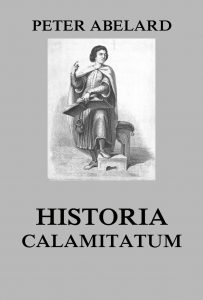Historia Calamitatum – The Story Of My Misfortunes – Peter Abelard
The Historia Calamitatum (A history of my calamities) is an autobiographical work by Peter Abelard, one of medieval France’s most important intellectuals and a pioneer of scholastic philosophy. It is written in the form of a letter and highly influenced by Augustine of Hippo’s Confessions. Peter Abelard was a pioneer of philosophy and university alike. The Historia Calimatatum provides readers with knowledge of his views of women, learning, monastic, life, Church and State combined, and the social milieu of the time.
Format: Paperback.
Historia Calamitatum – The Story Of My Misfortunes.
ISBN: 9783849674021.
Available at amazon.com and other venues.
The philosophical thought of Peter Abelard (from wikipedia.com)
The general importance of Abelard lies in his having fixed more decisively than anyone before him the scholastic manner of philosophizing, with the object of giving a formal, rational expression to received ecclesiastical doctrine. Though his particular interpretations may have been condemned, they were conceived in essentially the same spirit as the general scheme of thought afterwards elaborated in the 13th century with approval from the heads of the Church.
He helped to establish the ascendancy of the philosophical authority of Aristotle which became firmly established in the half-century after his death. It was at this time that the completed Organon, and gradually all the other works of the Greek thinker, first came to be available in the schools. Before his time, Plato’s authority was the basis for the prevailing Realism.
Outside of his dialectic, it was in ethics that Abelard showed greatest activity of philosophical thought. He stressed the subjective intention as determining, if not the moral character, at least the moral value, of human action. His thought in this direction, anticipating something of modern speculation, is remarkable because his scholastic successors accomplished least in the field of morals, hardly venturing to bring the principles and rules of conduct under pure philosophical discussion, even after they were made fully aware of Aristotle’s great ethical inquiries.
Regarding unbaptized who die in infancy, Abelard—in Commentaria in Epistolam Pauli ad Romanos—emphasized the goodness of God and interpreted St. Augustine of Hippo’s “mildest punishment” as the pain of loss at being denied the beatific vision (carentia visionis Dei), without hope of obtaining it, but with no additional punishments. His thought contributed to the forming of Limbo of Infants theory in the 12th–13th centuries.
(The text of the last section was taken from a Wikipedia entry and is available under the the Creative Commons Attribution-ShareAlike License.)
Publisher’s Note: This book is printed and distributed by Createspace a DBA of On-Demand Publishing LLC and is typically not available anywhere else than in stores owned and operated by Amazon or Createspace.

